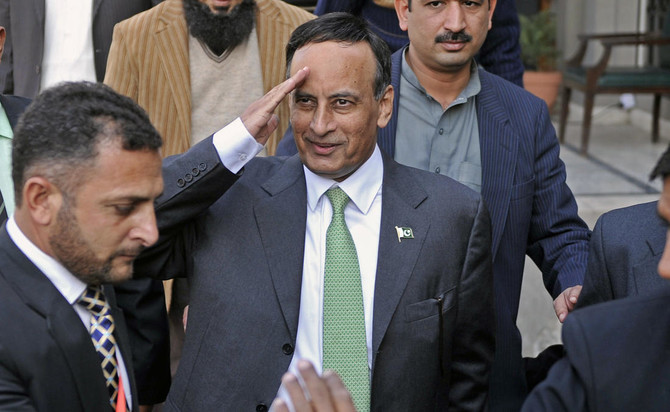KARACHI: Pakistan’s Federal Investigation Agency (FIA) has lodged a “first information report” against a former Pakistan ambassador to the US, Husain Haqqani, on charges of embezzlement and misuse of authority.
The report, filed after an FIA corruption inquiry, alleges that the offenses took place from 2008 to 2011 when Haqqani was Pakistan’s ambassador in Washington.
According to some reports, the FIA is in the process of issuing red warrants against Husain Haqqani.
Bashir Memon, director general of the FIA, refused to comment when contacted by Arab News.
On Feb. 15, Memon told Pakistan’s Supreme Court that a request had been sent to Interpol for red warrants for the former ambassador.
Haqqani said the new charges against him “will go nowhere.”
“False charges have been filed in Pakistan against me six years after my resignation. These charges have been manufactured after Interpol turned down an earlier request by the FIA,” he told Arab News.
“Their purpose is just to meet Interpol’s criteria for warrants because Interpol does not get involved in political cases.”
Legal expert Hassan Sabir said the first information report is significant, but will remain symbolic until Pakistan signs an extradition treaty with the US.
“This is an important development, but Haqqani can be indicted only once he comes to Pakistan,” Sabir said.
Murtaza Solangi, senior analyst and a former director general of state-run Radio Pakistan, said the report was an attempt to embarrass Haqqani.
“It has only limited propaganda value in Pakistan. In the world of realpolitik, it does not change anything. Unless Haqqani voluntarily returns to Pakistan, nothing will happen to him,” Solangi said.
In 2011, Haqqani was implicated in the “Memogate” case when Pakistani-American financier Mansoor Ijaz was revealed to have delivered a memo from the ambassador to Adm. Mike Mullen, then chairman of the US Joint Chiefs of Staff, offering greater government cooperation in return for US backing for Pakistan’s security establishment.
“I intend to carry on my life and let the FIA and the hidden hands behind it figure out how to fulfil their fantasy of forcing my return to Pakistan on false charges,” Haqqani said.
Pakistan launches fraud case against former envoy
Pakistan launches fraud case against former envoy

Hundreds of migrants, including Pakistanis, land in Greece after search operation at sea

- Rescued migrants were taken to a temporary facility on Crete after reaching the port of Agia Galini
- Greece has made deportations of rejected asylum seekers a priority under its migration policy
ATHENS: Greece’s Coast Guard rescued about 540 migrants from a fishing boat off Europe’s southernmost island of Gavdos on Friday, one of the biggest groups to reach the country in recent months.
The migrants were found during a Greek search operation some 16 nautical miles (29.6 km) off Gavdos, a Coast Guard statement said. They are all well and are being taken to a temporary facility on the nearby island of Crete after reaching the port of Agia Galini, a Coast Guard official said, adding most of the migrants were men from Bangladesh, Egypt and Pakistan.
In a separate incident on Thursday, the EU’s border agency Frontex rescued 65 men and five women from two migrant boats in distress off Gavdos, the Greek Coast Guard said.
Greece was on the front line of a 2015-16 migration crisis when more than a million people from the Middle East and Africa landed on its shores before moving on to other European countries, mainly Germany.
Flows have ebbed since then, but both Crete and Gavdos — the two Mediterranean islands nearest to the African coast — have seen a steep rise in migrant boats, mainly from Libya, reaching their shores over the past year and deadly accidents remain common along that route.
Greece, Cyprus, Spain and Italy will be eligible for help in dealing with migratory pressures under a new EU mechanism when the bloc’s pact on migration and asylum enters into force in mid-2026.
The center-right government of Prime Minister Kyriakos Mitsotakis has said deportation of rejected asylum seekers will be a priority.









